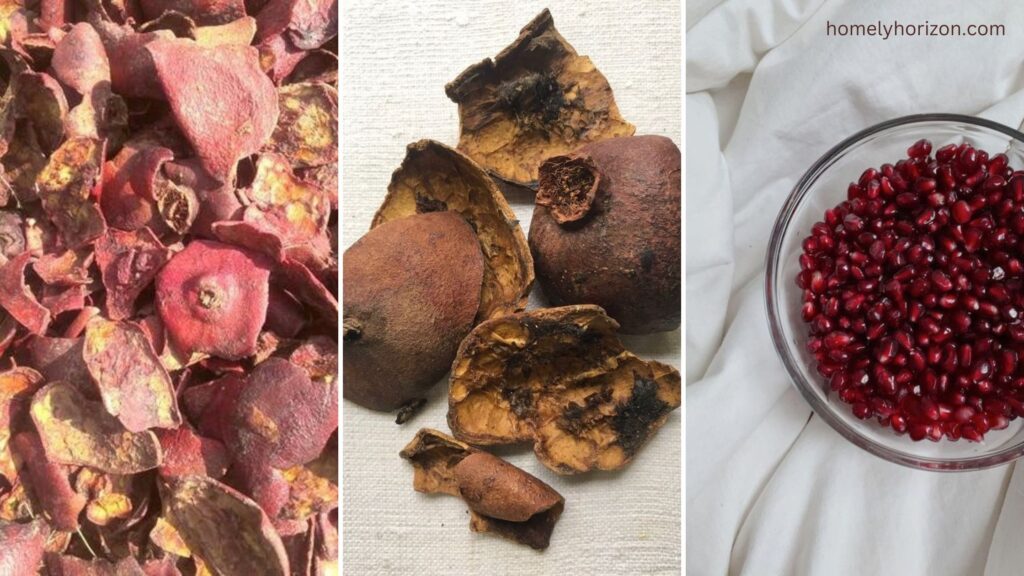Within the family Lythraceae, subfamily Punicoideae, the pomegranate (Punica granatum) is a deciduous shrub-yielding fruit. Pomegranates are used in cooking, baking, juice mixes, meal garnishes, smoothies and alcoholic drinks including wine and cocktails, either whole or in juice form.
Although pomegranates have several cultural connotations, symbolic meanings, and wholesome health benefits, their peels are an additional treasure to humankind as far as their medicinal value is concerned. Rich in traditional wisdom, pomegranate peels are prized for their powerful medicinal qualities in various cultures. Packed with minerals and antioxidants, they improve skin renewal, help with digestion, and relieve respiratory conditions. Their adaptability spans time, providing a comprehensive approach to well-being with everything from conventional medicines to contemporary compositions.
Let’s accept and dive into the heritage of pomegranate peels, a representation of strength and long-lasting health.
Pomegranate peels composition
About 40–50% of the weight of pomegranates is made up of peels. These have a natural supply of dietary fiber that ranges from 33 to 62 percent. Lignin has the largest fiber content in peel, with cellulose coming in second (16–22%).
Proteins, bioactive peptides, polysaccharides, hydrolyzable tannins (ellagic and gallic acids, pedunculagin, punicalin and punicalagin), flavonoids (anthocyanins, catechins, and other complex flavonoids), phenolic acids (hydroxycinnamic and hydroxybenzoic acids) and hydrolyzable tannins (ellagic and gallic acids) are all abundant in pomegranate peels.
In addition, organic acids, minerals (calcium, phosphorus, magnesium, potassium, and sodium), and fatty acids (mostly punicic, linoleic, and oleic acids found in the seeds) are found in pomegranate peels. The pomegranate peel composition is linked to several in-vitro bioactivities, including antioxidant, anti-inflammatory, anticancer, and antiproliferative properties which have been shown to have positive health impacts and are highly supportive of a healthy lifestyle.
Uses of Pomegranate Peels
Pomegranate Peel Powder
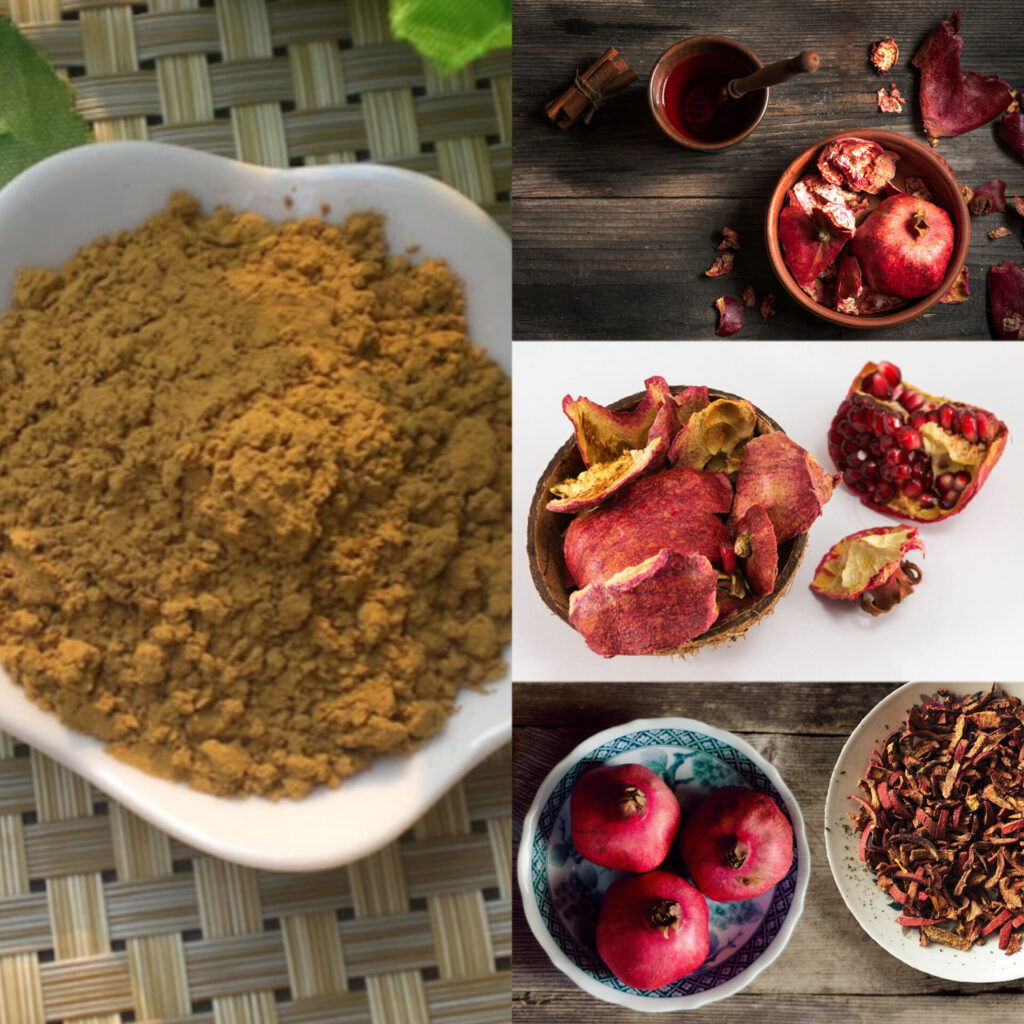
- Pomegranate peel powder can be made easily at home in a few steps-
- Separate the peep from the fruit.
- Let it dry naturally under the sun for 2 to 3 days or in the oven at the lowest setting for 2 to 3 hours.
- Blend the dried peels into a fine powder using a high-speed blender.
- Store in an airtight container for future use(preferably not over a month).
With its antiviral, antibacterial, and anti-inflammatory properties, this peel powder is said to be a powerful weapon against skin conditions like rashes, acne, and pimples. Because of its high antioxidant content, it helps prevent infections and bacteria. When applied as a face pack or facial scrub, subjective information indicates that pomegranate peels can also aid in the removal of dead skin cells from your face.
Dandruff has been efficiently controlled and hair loss has been prevented with the usage of pomegranate peel powder. Pomegranate peel’s antifungal properties help stop dandruff and lessen hair loss brought on by fungus.
You can also find and shop for pomegranate peel powder from several brands.
Pomegranate Peel Extract
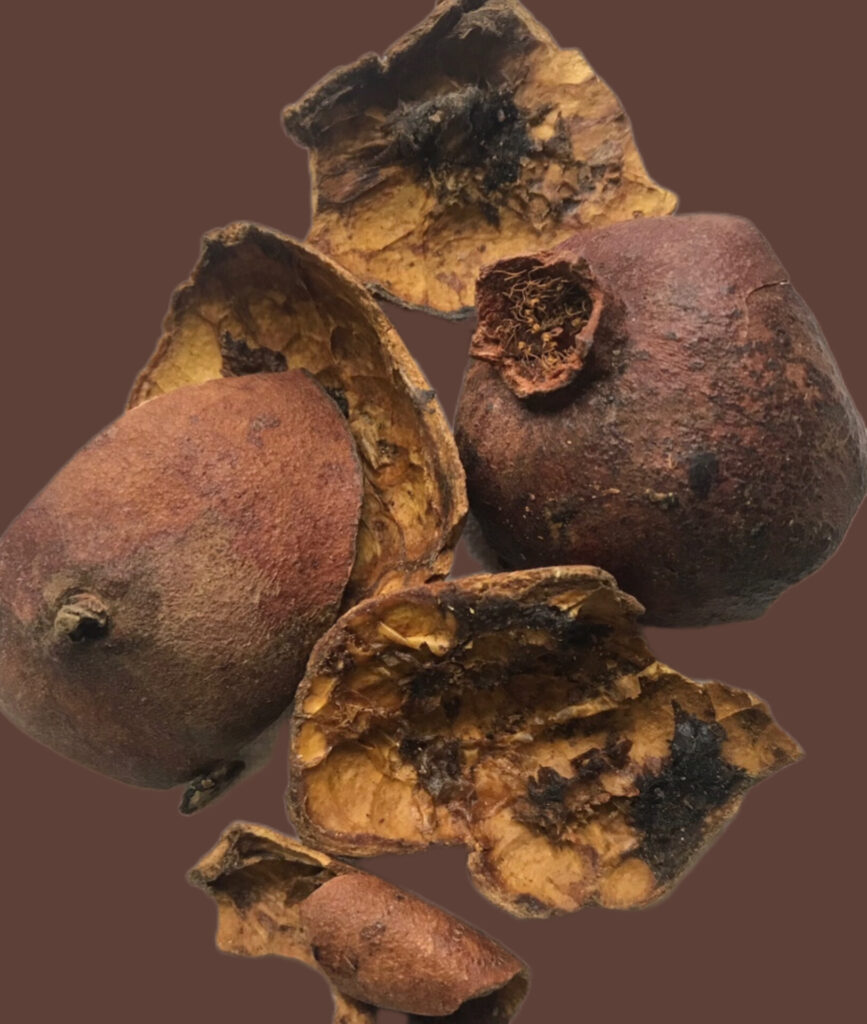
- First, gather dried pomegranate peels for your pomegranate extract.
- Using a blender or mortar and pestle, grind them into a fine powder.
- After that, let the powder steep in boiling water for ten to fifteen minutes.
- To preserve the liquid extract, strain the mixture to get rid of any solid particles.
- As an alternative, you can cook fresh pomegranate peels in water until the juice thickens and reduces to form an extract.
- To save the extract for later use, keep it refrigerated in a sealed jar.
Pomegranate peel extract is a powerful natural component used in food products because of its sharp flavor and antioxidant characteristics. Adding it to sauces, jams, and juices are common uses for it. It is a useful supplement to food preservation techniques because of its inherent preservative properties, which also increase the shelf life of perishable foods. Pomegranate peel extract is used in cosmetics because of its high vitamin and polyphenol content which protects and nurtures skin. It offers natural remedies for skincare issues and enhances the health of the skin. It is frequently found in moisturizers, serums, face masks, toners and cleansers.
Pomegranate Peel Tea
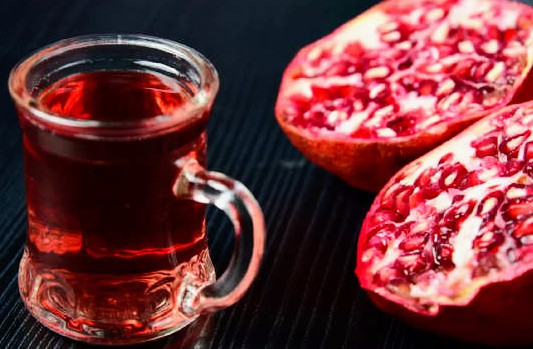
- Reduce the size of the dried peels by crushing them.
- Let the mashed peels sit in boiling water for a duration of 5 to 10 minutes.
- Pass the tea through a strainer.
- Add sugar or preferably jaggery for sweetness ( optional).
- Enjoy your homemade pomegranate peel tea.
Pomegranate peel tea can lower your blood pressure levels, in turn boosting heart health. This offers several functional and nutraceutical qualities owing to its bioactive ingredients, including reducing oxidative stress and restoring heart health. Its regular consumption is also said to reduce inflammation, and cholesterol and increase oxygen levels in your blood.
Pomegranate Peel Boiled in Water
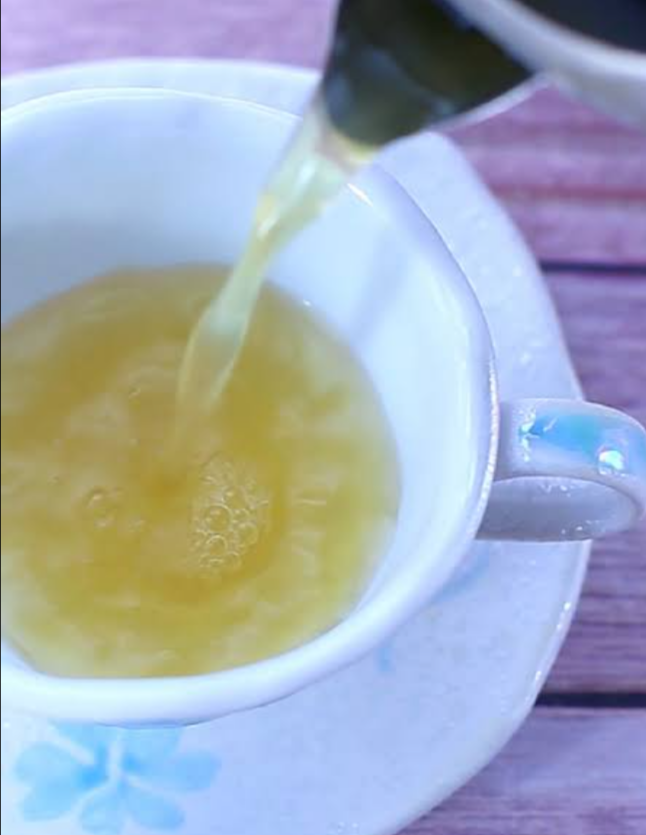
- Take some pomegranate peels (preferably fresh) and wash them thoroughly.
- Boil them in water for 10 to 15 minutes.
- Strain this water.
- Intake it while it’s lukewarm.
This pomegranate water reduces the risk of osteoporosis and bone fractures in postmenopausal women and is a beneficial beverage. In addition to this, peels rich in flavonoids, polyphenols, and tannins, when used as a dietary supplement, improve bone health.
Health benefits of Pomegranate Peels
Pomegranate Peel Powder Benefits for Skin

Pomegranate peels, in the form of pomegranate peel powder and extracts, provide amazing benefits for your skin:
- Antioxidant powerhouse: Pomegranate peels, high in polyphenols and flavonoids, fight free radicals, delaying the aging process of the skin and lowering oxidative stress.
- Collagen boost: By increasing skin elasticity and firmness and boosting collagen production, the peel helps to minimize wrinkles and fine lines.
- Acne fighter: Its antibacterial and anti-inflammatory qualities aid in the fight against germs that cause acne and reduce inflammation in the skin, resulting in a more radiant complexion.
- Hyperpigmentation control: Because pomegranate peels prevent melanin from being produced, they can aid in lightening scars, dark spots, and uneven skin tone, exposing a complexion that is more vibrant and brighter.
Know more about Skin care using pomegranate peels: Pomegranate Benefits on the Skin: Facts, Myths, How to Use It (healthline.com)
Pomegranate Peel Benefits for Stomach

Through a number of methods, pomegranate peels facilitate digestion and support gastrointestinal health:
- Astringent properties: The tannins in the peels have an astringent effect that regulates the digestive system and lowers inflammation.
- Fiber content: Packed full of dietary fiber, pomegranate peels encourage regular bowel movements which minimize constipation and facilitate better digestion in general.
- Anti-inflammatory effects: Elements such as the polyphenols found in pomegranate peels aid in lowering intestinal inflammation which lessens the signs and symptoms of inflammatory bowel conditions like ulcerative colitis and Crohn’s disease.
- Prebiotic potential: Compounds in pomegranate peels maintain healthy gut flow and aid in digestion by feeding good gut bacteria.
Pomegranate peel benefits for hair
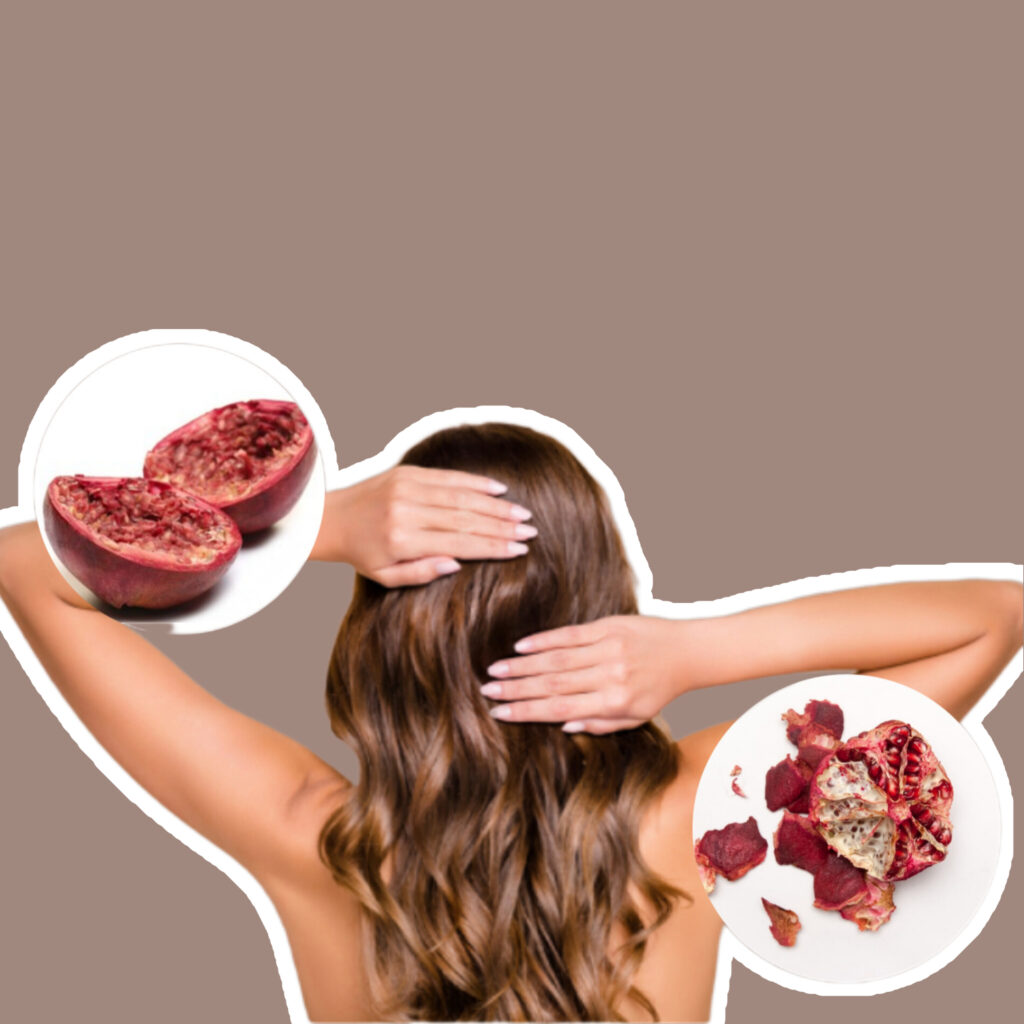
Pomegranate peels have beneficial aspects that promote healthy hair growth:
- High in vitamins and minerals: Vitamins A, C, and E, as well as minerals like calcium and magnesium, are found in pomegranate peels. These nutrients support healthy growth by nourishing the scalp and hair follicles.
- Antioxidant protection: By eliminating free radicals that may harm hair follicles, pomegranate peel as antioxidants, helps prevent hair loss and encourages stronger and healthier strands.
- Healthy scalp: The antibacterial and antifungal qualities of pomegranate peel extracts contribute to the maintenance of a healthy scalp environment, hence lowering dandruff and irritation of the scalp.
- Moisture retention: Extracts from pomegranates keep moisture in the hair, avoiding breakage and dryness and improving elasticity and shine.
Pomegranate Peels for Cough

Pomegranate peels’ natural properties provide cough relief:
- Antimicrobial Benefits: Pomegranate peel extracts have antibacterial qualities that are helpful in fighting off respiratory infections and reduce the intensity and duration of coughs.
- Throat Soothing: The peel’s organic relaxing qualities serve to reduce irritation in the throat and relieve scratchy and dry coughs. Compounds in pomegranate peel reduce the discomfort of coughing by minimizing respiratory tract inflammation.
The various applications and advantages of pomegranate peels highlight their exceptional worth in enhancing general health and wellness. Pomegranate peels have long been valued for their wide range of medicinal benefits, found in both conventional treatments and contemporary formulations. They provide respiratory relief, digestive support, and skincare benefits due to their high antioxidant, vitamin, and mineral content. Pomegranate peels are nourishing to the body on the inside and out, whether they are drunk as teas, infusions or blended into body care products.
However, cautious thought should be given to each person’s sensitivity and appropriate usage techniques. Using the inherent power of pomegranate peels, we may embrace age-old knowledge to nourish our bodies and improve our quality of life as we set out on a comprehensive path toward life force and longevity.
FAQs
1. What can be pomegranate peel side effects?
Although pomegranate peels provide several health advantages, there are some things to be aware of when using and consuming them-
- Pomegranate peels’ high fiber content and astringent nature can cause digestive problems including gas, bloating, or diarrhea when consumed in excess.
- Pomegranate peels may cause allergic reactions in people who have a history of sensitivities to pomegranates or related fruits. These reactions may appear as swelling, redness or itching.
- Make sure to completely wash fresh pomegranate peels before using them to avoid swallowing pesticide residues which can be harmful to your health.
- Do a patch test to check for any negative responses before using pomegranate peel extracts typically, especially for individuals with sensitive skin.
2. How can I use pomegranate peels for cough relief?
There are various remedies and methods for using pomegranate peels to alleviate cough symptoms, majorly, pomegranate peel extracts and pomegranate peel tea. A detailed analysis of the same is discussed above in this article.
3. Are pomegranate peels rich in antioxidants?
Because of the high concentration of polyphenols, flavonoids, and tannins in pomegranate peels, these fruits have strong antioxidant properties. These antioxidants neutralize oxidative stress and reduce cellular damage by eliminating dangerous free radicals from the body. Pomegranate peels help lower the chance of chronic illnesses like cancer, neurological diseases, and cardiovascular disorders by protecting cells from oxidative damage.
Pomegranate peels’ antioxidant-rich composition also benefits skin health by preventing premature aging, lowering inflammation, and boosting collagen formation. As a natural defense against the negative impacts of oxidative stress on the body and skin, regular consumption or application of pomegranate peel extracts can thus help in overall health and well-being.
4. Can pomegranate peel powder be used for all skin types?
Although pomegranate peel powder has several uses and benefits for different skin types, application should be carefully considered. Because of its natural astringent qualities, it’s perfect for oily and combination skin types as it helps reduce pores and manage excessive oil production. Its antioxidant concentration helps defend against environmental damage and rejuvenates normal to mature skin. Although the powder might irritate or trigger allergic responses in those with reactive or sensitive skin. It is advisable to do a patch test prior to extensive use.
Pomegranate peel powder should also be added gradually to skincare routines in order to determine compatibility and identify skin tolerance. Considering these things, careful application can successfully maximize its advantages for a variety of skin types.
5. Does using pomegranate peels have any significant benefits for the environment?
Yes, there are a lot of environmental advantages to using pomegranate peels. We lessen trash and our impact on the environment by repurposing the peels. Pomegranate peels can be turned into helpful items like compost or natural cleaning agents rather than being thrown away which adds to landfill pollution. Pomegranate peel compost enhances the quality of the soil and supports sustainable agricultural methods.
Additionally, adding them to green cleaning solutions lessens the need for chemical-heavy products which lessens the environmental impact of the solution as a whole. Pomegranate peels can also be used to produce biofuel, another alternative energy source, demonstrating their potential to support renewable energy sources. Adopting such techniques encourages a more sustainable and environmentally friendly future while also conserving resources.
Also Read: Best Workout Session Tips: Why Should You Eat Before a Workout?

